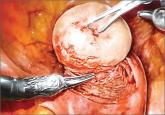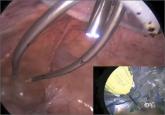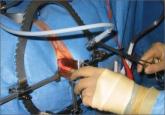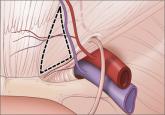Surgical Techniques

Tips and techniques for robot-assisted laparoscopic myomectomy
With robotic assistance, a surgeon can reduce blood loss, shorten hospitalization, and ease laparoscopic suturing and knot-tying—but myomectomy is...
Dr. Jackson is Medical Director, Robotic Surgery, Baylor Medical Center, Garland, Texas.
Dr. Tran is Associate Professor, Department of Obstetrics and Gynecology, University of California, Irvine.
Dr. Advincula is Professor and Vice Chair, Women’s Health, and Chief, Gynecology, Department of Obstetrics and Gynecology, Columbia University Medical Center. He also serves on the OBG Management Board of Editors.
Ms. Wiercinski is Women’s Health Clinical Care Coordinator, Celebration Health, Celebration, Florida.
Mr. Lopez is Prinicipal, Video Source Imagery, Inc, Orlando, Florida.
Dr. Advincula reports being a consultant to Blue Endo, CooperSurgical, Intuitive Surgical, and SurgiQuest and receiving royalties from CooperSurgical. The other authors report no financial relationships relevant to this article.

Appropriate patient positioning for laparoscopic and robotic surgery can help prevent postoperative neuropathies. This case-based video describes techniques and tips used by Dr. Advincula and team.
In this comprehensive educational video we review appropriate patient positioning for laparoscopic and robotic surgery to prevent postoperative neuropathies that can be experienced with gynecologic surgery. We also include a case-based review of injuries specific to the brachial plexus, ulnar nerve, and femoral nerve.
Our technique involves the use of a bed sheet, an egg crate foam mattress pad, and boot-type stirrups. We recommend setting up the operating room table to facilitate tucking of the patient’s arms and to prevent slippage of the patient when she is placed in steep Trendelenburg. For all steps involved, see the video.
Tips for setting up the operating room bed include:
Next month we continue our series on surgical techniques with a video on why choosing the proper colpotomy cup is critical for successful minimally invasive hysterectomy.

Will you be joining me at the AAGL Global Congress on Minimally Invasive Gynecology in Vancouver this November? Safe patient positioning for minimally invasive surgery and other exciting topics will be discussed. Visit www.aagl.org/globalcongress for more information.
—Dr. Arnold Advincula, AAGL 2014 Scientific Program Chair
Share your thoughts on this article! Send your Letter to the Editor to rbarbieri@frontlinemedcom.com. Please include your name and the city and state in which you practice.

With robotic assistance, a surgeon can reduce blood loss, shorten hospitalization, and ease laparoscopic suturing and knot-tying—but myomectomy is...

This striking educational video kicks off an exclusive surgical tips and techniques series from Arnold Advincula, MD

Vaginal hysterectomy is a 21st Century approach, thanks to tools, techniques, and other refinements from the fields of laparoscopy and robotics

Laparoscopic surgery is a safe and effective option for many patients, provided the surgeon knows the relevant anatomic landmarks and variations...
